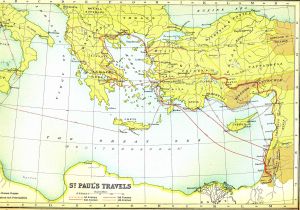Difference between revisions of "Epistle to the Colossians"
Graham grove (talk | contribs) |
Graham grove (talk | contribs) (Added tree links) |
||
| Line 47: | Line 47: | ||
In chapters [[Colossians 3|3]] and [[Colossians 4|4]] Paul writes practically, teaching about various duties that naturally flow from the doctrines he has expounded. The Colossians are exhorted to mind things that are above ([[Colossians 3]]:1-4), to mortify every evil principle of their nature, and to put on the new man ([[Colossians 3]]:5-14). Many special duties of the Christian life are also insisted upon as the fitting evidence of the Christian character. | In chapters [[Colossians 3|3]] and [[Colossians 4|4]] Paul writes practically, teaching about various duties that naturally flow from the doctrines he has expounded. The Colossians are exhorted to mind things that are above ([[Colossians 3]]:1-4), to mortify every evil principle of their nature, and to put on the new man ([[Colossians 3]]:5-14). Many special duties of the Christian life are also insisted upon as the fitting evidence of the Christian character. | ||
| − | {{returnto}} [[Christianity]] -> [[Bible]] -> [[New Testament]] -> [[Epistles]] | + | {{returnto}} [[Christianity]] -> [[Bible]] -> [[New Testament]] -> [[Epistles]] -> [[Pauline Epistles]] |
[[Category:Books of the New Testament]] | [[Category:Books of the New Testament]] | ||
[[Category:Epistles]] | [[Category:Epistles]] | ||
Revision as of 18:47, 17 September 2015
Colossians
 a map of the regions that Paul travelled. Colossae is in grid I-4 | |
| RELATED TOPICS | |
| SERMONS, ESSAYS AND OPINIONS | |
| CONTENTS | |
Chapters
Commentary
The Epistle to the Colossians is a book of the New Testament. It was a letter written by the apostle Paul to the church in Colossae.
Author and date
The letter begins by identifying the apostles Paul and Timothy as the authors. Paul's authorship is also confirmed by many of the church's early key figures such as Irenaeus, Clement of Alexandria, Tertullian, Origen, and Eusebius.
The letter was probably written by Paul at Rome during his first imprisonment there (Acts 28:16, 30). Suggested dates of writing range between 57 AD and 62 AD.
Recipient
The letter was written to the believers in Colossae, a city in the Lycus Valley (in modern day South-West Turkey.
The church had been founded by a man named Epaphras who was probably from Colossae.
The church probably was mostly formed through Gentile converts - Colossians 1:27
- to whom God was pleased to make known what are the riches of the glory of this mystery among the Gentiles, which is Christ in you, the hope of glory;
Tychicus was the bearer of the letter, as he was also of that to the Ephesians and to Philemon, and he would tell them of the state of the apostle (Colossians 4:7-9). After friendly greetings (10-14), Paul bids them to interchange this letter with the one that he had sent to the neighbouring Laodicean Church. (The apocryphal Epistle to the Laodiceans is generally believed to be a forgery based on this instruction)
Themes and outline
A major object of the letter, it seems, was to counteract certain false teaching that had arisen within the church of Colosse. These teachings are sometimes referred to as the Colossian heresy. The false teaching appears to have been teaching that attempted to combine the doctrines of Eastern mysticism and asceticism with Christianity, thereby promising believers enjoyment of a higher spiritual life and a deeper insight into the world of spirits.
Paul argues against such teaching, showing that in Christ they had all things. He sets forth the majesty of his redemption. The mention of the "new moon" and "sabbath days" (Colossians 2:16) suggests that Gnostic ascetics were judging the body of Christ for "eating and drinking" and observing the "feasts, New Moons, and Sabbaths." In response, Paul commands the saints to "let no one judge you...but the body of Christ," - that is, the church itself.
In Colossians 2 especially Paul emphasizes the pre-eminence of Jesus Christ. He particularly warns the Colossians against being drawn away from Christ "in whom dwelt all the fullness of the deity" (2:9), and who is the head of all spiritual powers. Christ, Paul reminds them, is the head of the body of which they are members; and if they are truly united to him, what further need do they have?
In chapters 3 and 4 Paul writes practically, teaching about various duties that naturally flow from the doctrines he has expounded. The Colossians are exhorted to mind things that are above (Colossians 3:1-4), to mortify every evil principle of their nature, and to put on the new man (Colossians 3:5-14). Many special duties of the Christian life are also insisted upon as the fitting evidence of the Christian character.
Return to Christianity -> Bible -> New Testament -> Epistles -> Pauline Epistles